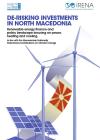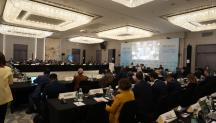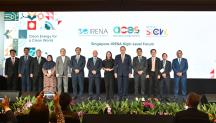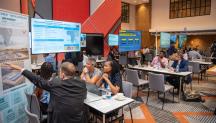

-
-
IRENA and UNDP (2021), De-risking investments in the Republic of North Macedonia: Renewable energy finance and policy landscape focusing on power, heating and cooling. In line with the Macedonian Nationally Determined Contributions on Climate Change, International Renewable Energy Agency, United Nations Development Programme, Abu Dhabi.
Copied
/-/media/Files/IRENA/Agency/Publication/2021/Oct/IRENA_UNDP_De-risk_Investments_North-Macedonia_2021.pdf
Copied
De-Risking Investments in North Macedonia
Newsletter
Renewable Energy Finance and Policy Landscape Focusing on Power, Heating and Cooling
Consistent with the Nationally Determined Contribution (NDC) submitted to the United Nations Framework Convention on Climate Change (UNFCCC), the Republic of North Macedonia adopted the National Strategy for Energy Development (NSED) up to 2040 in December 2019, highlighting three possible scenarios for reducing carbon emissions. In April 2021, the government submitted the enhanced NDC to the UNFCCC Secretariat and and the draft National Energy and Climate Plan (NECP) to the Energy Community Secretariat.
These national strategies and plans placed energy-related policies and actions at the centre of decarbonisation efforts, including commitments to specific targets for renewable energy in power and heating and cooling, and for the electrification of heating and cooling.
This report, developed by the International Renewable Energy Agency (IRENA) and the United Nations Development Programme (UNDP) under the Climate Promise cooperation framework sets out to identify barriers and provide recommendations for de-risking of renewable energy investments, to support North Macedonia accelerate the implementation of its enhanced NDC. The report presents an overview of the renewable energy finance and policy landscape in North Macedonia; identifies barriers and associated risks which can hold back private-sector investment in renewable energy, focusing on power and heating and cooling; and presents recommendations on policy frameworks and financial de-risking instruments to scale up renewable energy investments, taking into account the need for a post-Covid recovery agenda that aims to achieve resilience, development, and equality.
The opportunity lies with the speedy implementation of specific actions to address project start-up barriers, as well as development and investment risks. In parallel, preparations need to commence for medium- to long-term actions that will target scaling up investments as the renewable energy market in North Macedonia matures.
The analysis suggests that combined action by the government of North Macedonia and development finance institutions (DFIs) would contribute to reducing risks related to renewable energy investment. This collaboration would be conducive to attracting first institutional investors in the medium to long term, followed by other private finance players to the market.




